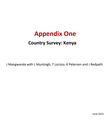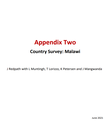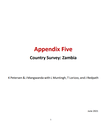The severity of the punishment, if caught, is not a deterrent to committing crime. If consumers of alcohol can be fairly certain that if they get behind the steering wheel of a vehicle that they will be stopped and tested, they will be less likely to do so and make alternative arrangements or postpone their travel.
ACJR Publications
The number of prisoners writing matric is so frightfully small that we are left pondering how this is even possible 27 years into democracy. The fewer than 200 prisoners writing matric annually pales in comparison with the 111,000 sentenced prisoners in South Africa – less than half a percent.
How much discretion does a prosecutor have to decline to prosecute? Is mediation always a good thing? Is there sometimes an obligation to prosecute? Does compensation for the victim trump societal criminal justice interests? These are vexing questions, especially when attempting to answer them in the abstract. A recent case may help in crystallising some thoughts.
Appointing Directors to the Boards of State-Owned Enterprises: A proposed framework to assess suitability
Africa’s prisons are a long-standing concern for rights defenders given the prevalence of rights abuses, overcrowding, poor conditions of detention and the extent to which the criminal justice system is used to target the poor. The paper surveys 24 southern and east African countries within the context of COVID-19. Between 5 March and 15 April 2020 COVID-19 had spread to 23 southern and east African countries, except Lesotho. The overwhelming majority of these countries imposed general restrictions on their populations from March 2020 and nearly all restricted visits to prisons to prevent the spread of the coronavirus. The pandemic and government responses demonstrated the importance of reliable and up to date data on the prison population, and any confined population, as it became evident that such information is sorely lacking. The World Health Organization recommended the release of prisoners to ease congestion, a step supported by the UN Subcommittee on Prevention of Torture. However, the lack of data and the particular African context pose some questions about the desirability of such a move. The curtailment of prison visits by external persons also did away with independent oversight even in states parties to the Optional Protocol to the Convention against Torture (OPCAT). In the case of South Africa, prison monitors were not listed in the ensuing legislation as part of essential services and thus were excluded from access to prisons. In the case of Mozambique, it was funding being placed on hold by the donor community that prevented the Human Rights Commission from visiting prisons. The COVID-19 pandemic has highlighted long-standing systemic problems in Africa’s prisons. Yet African states have remained remarkably reluctant to engage in prison reform, despite the fact that poorly managed prisons pose a significant threat to general public health care.

Democratic policing, as opposed to regime policing, must meet at least three requirements: there is democratic accountability of and for the police; the police adhere to the rule of law; and the police behave in a manner that is procedurally fair in service of the public. The article presents a conceptual framework of nine dimensions applicable to different contexts with a view to facilitate policies and practices towards democratic policing. It is argued that the ultimate result being sought is a legitimate police service. If legitimacy is the result, then trust is the outcome preceding it. Legitimacy is dependent on the public’s trust that State power will be used in the public interest. Public trust therefore fulfils an important legitimising function. Levels of trust in the police are driven by the police’s ability and performance record with reference to three outputs: objectivity, empathy and responsivity. The latter three outputs flow from five input variables, namely: knowledge of what works in creating a safer society from a policing perspective; rights-based policing; accountability of the policing (inclusive of transparency); efficiency and effectiveness of resource utilisation; and the police as citizens also entitled to rights and protections. The utility of the conceptual framework lies in providing a coherent and linked-up view to analyse police organisations and support the development of reform proposals.

Report by J Mangwanda with L Muntingh, T Lorizzo, K Petersen and J Redpath

Report by J Redpath with L Muntingh, T Lorizzo, K Petersen and J Mangwanda

Report by T Lorizzo & V Petrovic with L Muntingh, J Redpath, K Petersen and J Mangwanda

Report by K Petersen with L Muntingh, T Lorizzo, J Redpath and J Mangwanda

Report by K Petersen & J Mangwanda with L Muntingh, T Lorizzo, and J Redpath

This paper explores the relationship between the provinces and the NPA by looking at the legal framework as well as a few case studies and examples of cooperation that have emerged. Recommendations are made for a way forward. Report by Lukas Muntingh
Esta folha informativa discute o policiamento democrático como significando: (1) a obediência da Polícia ao Estado de Direito, (2) a responsabilização da Polícia, e (3) a justiça processual por parte da Polícia ao serviço do público. Nove dimensões necessárias ao policiamento democrático são identificadas, sendo que o resultado final pretendido é a confiança pública na Polícia, algo que resulta da sua legitimidade. O quadro conceptual apresentado não se destina apenas a descrever o policiamento democrático, mas também a orientar o planeamento estratégico nas organizações policiais, incluindo a Polícia da República de Moçambique (PRM).
This submission considers a selection of the provisions of the draft SAPS Bill 2020 affecting local and provincial government.
This submission deals with two issues (1) Coordination across the criminal justice system (2) Priorities for reform in SAPS as they pertain to the draft SAPS Amendment Bill 2020.
